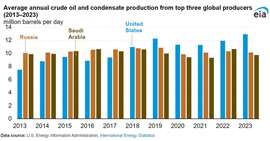Read this article in 中文 Français Deutsch Italiano Português Español
EIA: U.S. sets global production record
March 11, 2024
U.S, Russia, China account for 40% of global oil production

For the past six years in a row, the United States produced more crude oil than any nation at any time in history, according to the U.S. Energy Information Administration (EIA).
Crude oil production in the United States, including condensate, averaged 12.9 million barrels per day (b/d) in 2023, breaking the previous U.S. and global record of 12.3 million b/d, set in 2019. Average monthly U.S. crude oil production established a monthly record high in December 2023 at more than 13.3 million b/d.
The EIA said the crude oil production record in the United States in 2023 is unlikely to be broken in any other country in the near term because no other country has reached production capacity of 13.0 million b/d. Saudi Arabia’s state-owned Saudi Aramco recently scrapped plans to increase production capacity to 13.0 million b/d by 2027.
Together, the United States, Russia, and Saudi Arabia accounted for 40% (32.8 million b/d) of global oil production in 2023. These three countries have produced more oil than any others since 1971 (counting production in the Russian Federation of the Soviet Union prior to 1991), although the top spot has shifted among them over the past five decades. By comparison, the next three largest producing countries—Canada, Iraq, and China—combined produced 13.1 million b/d in 2023, only slightly more than what was produced in the United States alone.
After peaking at 9.6 million b/d in 1970, annual U.S. crude oil production flattened and then generally declined for decades to a low of 5.0 million b/d in 2008. Crude oil production in the United States began increasing again in 2009, as producers increasingly applied hydraulic fracturing and horizontal drilling techniques, and has increased steadily since. The only exception to U.S. production growth since 2009 was in 2020 and 2021, when demand and prices decreased because of the economic effects of the COVID-19 pandemic. In recent years, crude oil production in the Permian Basin (in western Texas and eastern New Mexico) drove the increases in total crude oil and natural gas production in the United States.
Russia was the country with the most crude oil production in 2017, but production growth in Russia has since lagged behind the United States. Average annual production in Russia peaked in 2019 at 10.8 million b/d, when it trailed the United States by 1.4 million b/d. More recently, Russia was among the OPEC+ countries that announced production cuts in November 2022, and in February 2023, it separately announced additional voluntary cuts of 500,000 b/d. Although voluntary cuts have reduced recent production in Russia, we believe sanctions and voluntary actions by companies in response to the full-scale invasion of Ukraine have been the primary cause of the cuts. Actual cuts to production appear to be smaller than anticipated, however, and we estimate that production in Russia declined by only 200,000 b/d in 2023.
Average annual production in Saudi Arabia peaked in 2022 at 10.6 million b/d, which was 1.3 million b/d less than in the United States that year. In 2023, crude oil production in Saudi Arabia declined by about 900,000 b/d because of OPEC+ cuts and further voluntary cuts Saudi Arabia made to offset weaker demand growth. Production in Saudi Arabia could not exceed the 2023 production volume in the United States because state-owned Saudi Aramco’s stated production capacity is 12.0 million b/d, with about 300,000 b/d of additional capacity from its share of the Neutral Zone area shared with Kuwait.
MAGAZINE
NEWSLETTER

CONNECT WITH THE TEAM









